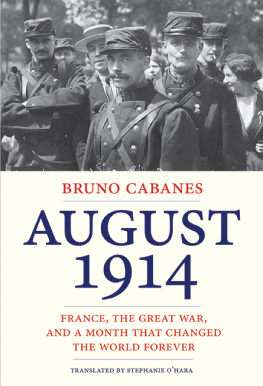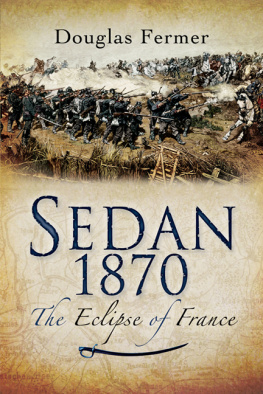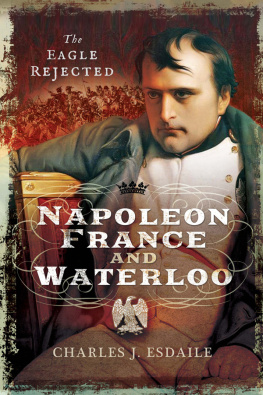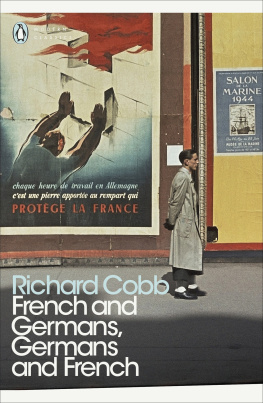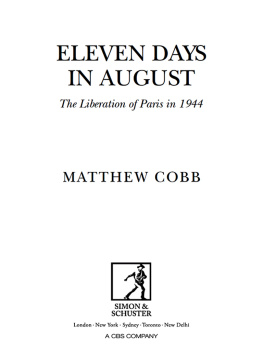

Published with assistance from the Kingsley Trust Association Publication Fund established by the Scroll and Key Society of Yale College.
English translation 2016 by Yale University. Translated 2016 by Stephanie OHara.
Originally published as Aot 14. ditions GALLIMARD , Paris, 2014.
Map by Bill Nelson.
All rights reserved.
This book may not be reproduced, in whole or in part, including illustrations, in any form (beyond that copying permitted by Sections 107 and 108 of the U.S. Copyright Law and except by reviewers for the public press), without written permission from the publishers.
Yale University Press books may be purchased in quantity for educational, business, or promotional use. For information, please e-mail (U.K. office).
Set in Janson Roman type by IDS Infotech, Ltd.
Printed in the United States of America.
Library of Congress Control Number: 2015959532
ISBN 978-0-300-20827-6 (hardcover : alk. paper)
A catalogue record for this book is available from the British Library.
This paper meets the requirements of ANSI/NISO Z39.48-1992 (Permanence of Paper).
10 9 8 7 6 5 4 3 2 1
Contents
Acknowledgments
My thanks go to Stphane Audoin-Rouzeau, Annette Becker, David Blight, Raphalle Branche, Anne and Bernard Chambaz, lodie and Jrme Chapuis, Alice Conklin, Maa and Thomas Dodman, Theodora Dragostinova and Bud Barnes, Valrie Hannin, John Horne, Christian Ingrao, Brian Jordan, Anne and Neil Josephy-Zack, Alice Kaplan, Gina and Doug Lee, Patricia Martin, Herv Mazurel, Carol and John Merriman, Sverine Nikel, Geoffrey Parker, Antoine Prost, Mary Louise Roberts, Anne and Benot Rolland, Henry Rousso, Vronique and Vincent Roux, Maurie Samuels, Jennifer Siegel, Leonard V. Smith, Gene Tempest, and Francesca Trivellato for their friendship, advice, and support. Twenty-five years ago, I began to work on the First World War with Jean-Jacques Becker, the great historian of 1914. I owe him so much.
My family and I are grateful for the warm welcome we found in Columbus and Bexley after arriving from Connecticut in 2014. I owe a great deal to my wonderful friends and colleagues from the History Department at Ohio State University, to Peter Hahn and Nate Rosenstein, and especially to my colleagues in military history, Mark Grimsley, Joe Guilmartin, Pete Mansoor, Geoffrey Parker, and Jennifer Siegel. It is a great honor to be the inaugural Donald G. and Mary A. Dunn Chair in Modern Military History. I wish to express my profound gratitude to Donald Dunn and the Dunn family for their kindness, their support, and their generosity. I cannot imagine my life without the pleasure of teaching and the intellectual company of students. I am particularly grateful to our many talented graduate students at Ohio State University.
I thank my editor at Gallimard, Ran Halvi, for everything this book owes to him, and also Arnaud Jamin and Philippe Bernier. At Yale University Press, I had the privilege of working with Eric Brandt, Chris Rogers, Erica Hanson, and Dan Heaton. Thanks must be extended to the readers for the Press who provided me with helpful advice. For having read and commented on my manuscript at various stages, my dear friends Alice Kaplan and Bernard Chambaz have my profound gratitude. Special thanks also to Stephanie OHara, associate professor at the University of Massachusetts Dartmouth, for her splendid translation of my book.
Gene Tempest shared her knowledge of the environmental history of the war. Damien Baldin, Emmanuel Saint-Fuscien, and Clmentine Vidal-Naquet provided documents, advice, and bibliographic references. Many thanks to them, and to Emmanuel Dupont, Mattie Fitch, Anthony Guiet, and especially Michel Roux and Pierre Simon, who did significant archival research. I also wish to thank the staffs of the Archives dpartementales in the Bouches-du-Rhne, Loire-Atlantique, Maine-et-Loire, Mayenne, Puy-de-Dme, and Vende, as well as the staffs of the Archives nationales, the Archives de la prfecture de police de Paris, the Bibliothque de documentation internationale contemporaine in Nanterre, and the Sterling Library at Yale University, all of whom provided access to their marvelous collections.
For more than ten years, my wife, Flora, and I have been living in the United States. Without her love, support, and endless generosity, nothing would be possible. More profoundly than I can express, she has made me see what really matters in life.
This book is dedicated to our beautiful daughters. Gabrielle and Constance, this book is for you, with all my love, in memory of your great-grand-uncle Athanase, whose name means the immortal: a particularly fitting name for a survivor of the collective catastrophe of 1914. I would rather never have been born, he used to say, than have to relive everything I went through.
Bexley, October 2015
Translators Acknowledgments
Sincere thanks to Edward M. Strauss, translator of Poilu: The World War I Notebooks of Corporal Louis Barthas, Barrelmaker, 19141918 (Yale University Press, 2014), and to an anonymous reader for their patience and helpful comments on the manuscript. It has been a pleasure to work with the extremely efficient and accommodating Erica Hanson and Dan Heaton of Yale University Press. Jesse Waidler of the Massachusetts Army National Guard kindly discussed military terminology with me. My colleague Marie McDonough provided in-valuable assistance in translating . And finally, I thank Bruno Cabanes for his unstinting support and collegiality.
Introduction
On August 1, 1914, war erupted into the lives of millions of men and women across France. Men set out to fight, confident that their cause was just. Plan XVII, adopted in April 1913, gave hopes for a swift victory. The joint forces of the French army prepared for combat; their mission was to strike the center of the German front. It was thought that the end of the conflict would be settled in one battle, perhaps costly in terms of human lives, but decisive. With hindsight, after four years of bloody, murderous combat that traumatized an entire generation, it is astonishing that the Great War was initially conceived of as an affair of a few weeks.
In fact, this was very nearly what happenedbut not following the scenario that French strategists imagined. Only three weeks after the mobilization, thousands upon thousands of young men were slaughtered on the battlefields of Charleroi, Rossignol, and Morhange. Retreat followed at the end of August. This early catastrophe left an indelible imprint on French soldiers and civilians alike. Had it not been for the counteroffensive on the Marne at the beginning of September, the war on the Western Front might have ended there, inflicting an even more humiliating defeat on the French than had the Franco-Prussian War of 187071.
Intense violence characterized the early weeks of the First World War. The decisive month of August 1914 has often been studied from the viewpoint of diplomats and general staffs but rarely from the perspective of a country and its inhabitants in the grip of war. This book, then, is first of all a history of the French as they faced one of the most frightening collective ordeals of the twentieth century. It is also a history of rural France, whose everyday life in 1914 to 1918 remains largely unknown. Yet it was this France that supplied half of the mobilized soldiers. And this is a history of urban France, which saw thousands of soldiers stream in and out of its train stations. In short, this book is an intimate history of the end of a world.
Next page
